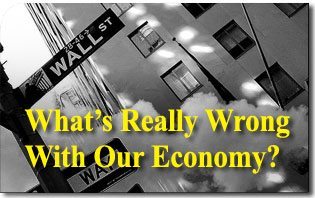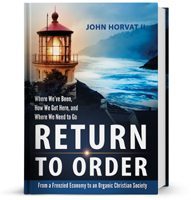 The debate over what’s really wrong with our economy seems irreconcilably divided into two camps.
The debate over what’s really wrong with our economy seems irreconcilably divided into two camps.
On one side you have those who claim everything will be all right if we could just get big government out of our economy. On the other side, the Paul Krugmans of the world are shouting all the louder: get more big government into our economy and everything will be fine and dandy.
Neither argument gets to the root of why we are in the situation we are in today. We are in our present state not only because big government put itself in economy but above all because morality has been taken out.
There is an underlying moral problem that urgently needs to be addressed. This can be seen in a reckless and restless spirit inside some key segments of modern economy. It creates frenzied markets that lead people to resent the very idea of restraint and scorn the spiritual, religious, moral and cultural values that normally serve to order and temper economic activity.
You can see this in newfangled investment products and derivatives in the world of finance that run enormous risks. You can see it in speculative bubbles like the 2008 subprime mortgage crisis or in massive debt.
However, most of us sense this frenetic spirit in our frenzied and rushed lifestyles. Instant gratification is the order of the day. We must have everything now, instantly, regardless of the consequences. We demand the latest and greatest version of the most powerful gadget. We must have that house now with neither money down nor means to pay. Consumers are encouraged to spend with reckless abandon with the click of a mouse or the swipe of a card.
This frenzied way of life ends up destroying morality, sacrifice and restraint. It ends up attacking economy’s natural immunity systems of family, community and Church that normally defend society against intemperance and keep economy in balance.
We can compare our economy to a very healthy and robust human body – it’s the biggest and best around with an enormous capacity to work. But there is also a drug that enters into the veins of this healthy body and wreaks havoc upon its systems. It breaks down the body’s defenses. It can even stimulate the muscles to work harder and frenetically. The end result, however, is an enormous imbalance in the body. At times, the whole system crashes.
Our problem today is that this drug is undermining and dominating our robust economy; it’s setting the tone. It’s tearing our economy and society apart.
That’s why I think the debate has not been well framed. Everyone seems to be arguing over how we are going to keep the frenzied party going and who is going to pay the bill – the free market or the government.
Let the free market work, one side says, give us fortified vitamins (tax breaks) to let the body naturally adjust to frenzy. The liberals say we need artificial steroids (stimulus packages) to jumpstart the drugged-out body.
We need to address the real issue – the drug. I call this reckless frenzy “frenetic intemperance,” which like an addiction is getter ever worse. I contend that we need to get rid of this now-dominant frenetic intemperance so the economy can be stable, healthy and prosperous once again.
This cannot be done by legislation, regulation or rigid planning since it will strangle commerce penalizing especially the innocent. It cannot be done through completely unrestrained markets outside of virtue, since these are volatile and will often crash.
This is a moral problem that needs a moral solution. We need to go to the root of the problem deep inside the soul of modern man. The only real response to frenetic intemperance is a corresponding temperance. And this temperance is found in what I call an organic Christian society.

John Horvat II is a scholar, researcher, educator, international speaker, and author. His book Return to Order: From a Frenzied Economy to an Organic Christian Society—Where We’ve Been, How We Got Here, and Where We Need to Go will be published February 19.
